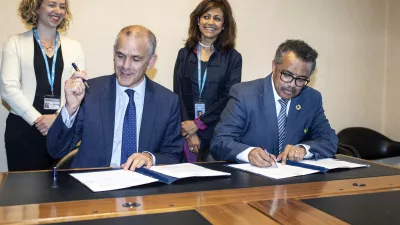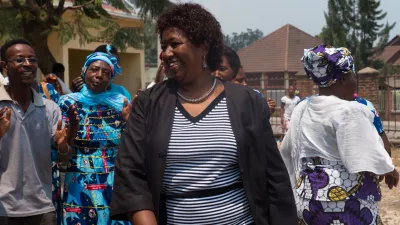News releases
Read the latest news from IHME about published research.St. Jude Children’s Research Hospital and Institute for Health Metrics and Evaluation collaborate to improve knowledge of childhood cancer worldwide
St. Jude Children’s Research Hospital and the Institute for Health Metrics and Evaluation are partnering to advance knowledge and understanding of childhood cancer around the world.
WHO and IHME collaborate to improve health data globally
The World Health Organization and the Institute for Health Metrics and Evaluation (IHME) have formally agreed to collaborate in improving the accuracy, timeliness, and policy-relevance of health data. A memorandum of understanding (MOU) signed today will result in increased awareness and understanding of health problems globally, as well as the evaluation of strategies to address them.
$100,000 Roux Prize awarded for saving children’s lives through vaccines in Mali
A Malian physician who also teaches at the University of Maryland will receive $100,000 for using health data to save children’s lives through a comprehensive vaccination program.
Roux Prize awarded for expanding health insurance in the Philippines
A Filipino epidemiologist and professor has been awarded $100,000 for using health data to identify the most taxing health problems in the Philippines, helping his country expand health coverage and reduce the costs involved.
Partnering to improve cancer diagnostics and treatment in Africa
Alongside leaders from the nonprofit world, industry, and health care organizations, the Institute for Health Metrics and Evaluation (IHME) recently joined a new coalition to improve cancer diagnostics and treatment in developing countries.
Dr. Agnes Binagwaho, Minister of Health of Rwanda, wins Roux Prize for using data to improve Rwandan health
Dr. Agnes Binagwaho, a trained pediatrician and Minister of Health of Rwanda, is the second winner of the Roux Prize, a US$100,000 award for turning evidence into health impact and the largest prize of its kind. Dr. Binagwaho has been using Global Burden of Disease (GBD) data and evidence from the Ministry’s own data-gathering efforts to ensure the country’s limited resources are saving the most lives and reducing suffering.
El Dr. Rodrigo Guerrero gana el Premio Roux por usar datos para abordar la violencia como una crisis de salud pública en Cali, Colombia
El Dr. Rodrigo Guerrero, un epidemiólogo educado en Harvard, y alcalde de Cali, Colombia, es el primer ganador del Premio Roux, un premio nuevo de US$100,000 por convertir la evidencia en una influencia sobre la salud y el mayor premio en su clase.
Dr. Rodrigo Guerrero wins Roux Prize for using data to address violence as a public health crisis in Cali, Colombia
Dr. Rodrigo Guerrero, a Harvard-trained epidemiologist and mayor of Cali, Colombia, is the first winner of the Roux Prize, a new US$100,000 award for turning evidence into health impact and the largest prize of its kind.





